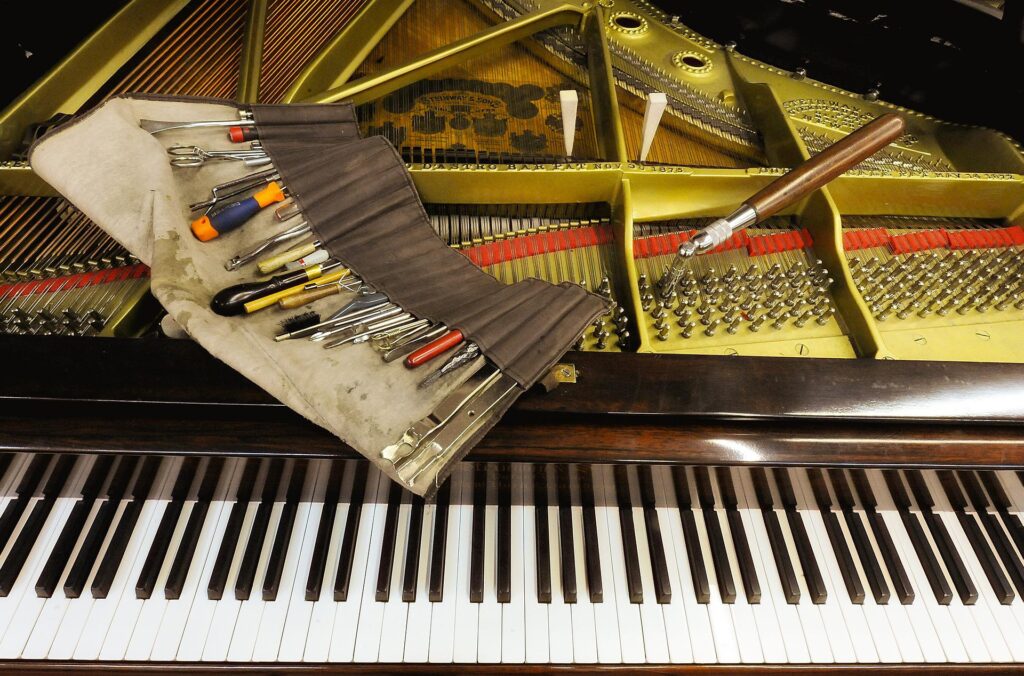Piano Lessons
How often should I tune my piano?
This article will try to answer the question by considering the different uses the instrument can have.
It is worth noticing that the ideal situation for all types of pianos and scenarios would be to keep them in tune by continuously retouching all the notes that go out of tune. However, piano technicians’ current prices and availability prevent us from doing that very often.
So, how long should we wait until the next tuning in this scenario?
The standard recommendation would be to tune it about every six months.
It is estimated that after six months, a good piano will hold the tuning well enough so that it does not bother the ear too much until the next tuning. Nevertheless, it is important to note that not all pianos will behave similarly. For example, the instrument’s size or age will affect how long it will take to go out of tune. An old piano will probably go out of tune quicker than a brand-new one because all those years of tension that the pin block received will naturally render the pins loose over time.
On a different note, a big piano, like a Grand Piano, will hold the tuning much longer than a small upright. Essentially, the longer the strings, the less tension they will inflict on the pins. For instance, to achieve the bass sounds, the length of the strings is longer than in the treble. Consequently, a small piano needs to compensate for the lack of physical space by putting thicker strings, producing more tension and making the pins loose earlier.
Of course, if one had interest and no monetary limits, the best thing to do would be to tune it every day, or relatively, as soon as a note is perceived to be out of tune. But that is a fairy tale. It is very hard for people who study for fun or even serious music students to have the money to do that. However, pianos in theatres, piano schools and music establishments should do it because they must keep their instruments in the best condition. Ideally, they should have a piano technician as part of the institution to keep the pianos in tune and track them over the months, not only for the tuning but also for regulation, toning, and other maintenance tasks. Lastly, an absolute requirement is that pianos in important theatres are tuned before and after the concerts (something that does not always happen).
In addition to the six months recommendation, we have two more options.
The first one is to tune the piano every year, a suitable choice for amateur or not perfectionists of clean sound. It will keep the instrument in good condition, but the results will depend mainly on the quality of the piano.
On the other hand, for the more demanding ones, it is best to tune it every three to four months (generally after the season changes). The latter option should be more suitable for advanced and intermediate piano students who require a well-maintained instrument.
In any case, the premise should be not to wait too much time when we perceive out-of-tune notes, always considering our budget.
As a side commentary, if you are an advanced pianist, having the piano out of tune could imply that you will modify your way of playing to compensate for your output. When a piano is in tune, naturally, it will sound louder and clearer (because the partials of the harmonics will match and resonate). But when it is not, you could play with a heavier touch or generally louder to get the same amount of sound from the instrument.
What happens if my piano goes longer than twelve months without tuning?
In that case, it can be very harmful to the piano and challenging for the technician to raise the tuning again without cutting some strings or causing damage to the piano. Therefore, it would be advisable to take the one-year limit as the maximum amount of time to pass before tuning them again.
In conclusion, let us take care of our pianos, so they will sound more pleasant and stimulating for us to sit down every day to study and keep improving as pianists.
If you liked the article, please check more like this one on the WKMT Blog.

